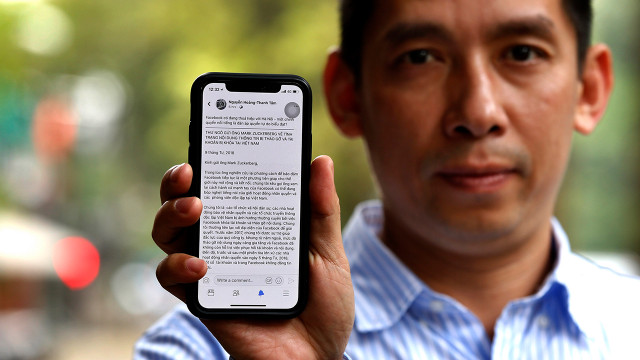Pew Research Center
BY AARON SMITH, LAURA SILVER, COURTNEY JOHNSON, KYLE TAYLOR AND JINGJING JIANG
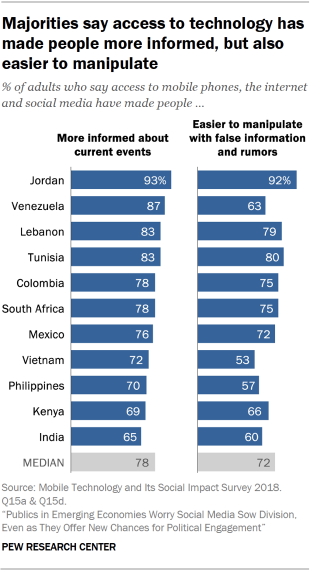 In recent years, the internet and social media have been integral to political protests, social movements and election campaigns around the globe. Events from the Arab Spring to the worldwide spread of#MeToo have been aided by digital connectivity in both advanced and emerging economies. But popular social media and messaging platforms like Facebook and WhatsApp have drawn attention for their potential role in spreading misinformation, facilitating political manipulation by foreignand domestic actors, and increasing violenceand hate crimes.
In recent years, the internet and social media have been integral to political protests, social movements and election campaigns around the globe. Events from the Arab Spring to the worldwide spread of#MeToo have been aided by digital connectivity in both advanced and emerging economies. But popular social media and messaging platforms like Facebook and WhatsApp have drawn attention for their potential role in spreading misinformation, facilitating political manipulation by foreignand domestic actors, and increasing violenceand hate crimes.
Recently, the Sri Lankan government shut down several of the country’s social media and messaging services immediately after Easter day bombings at Catholic churches killed and wounded hundreds. Some technology enthusiasts praised the decision but wondered if this development marked a change from pro-democracy, Arab Spring-era hopes that digital technology would be a liberating tool to a new fear that it has become “a force that can corrode” societies.
In the context of these developments, a Pew Research Center survey of adults in 11 emerging economies finds these publics are worried about the risks associated with social media and other communications technologies – even as they cite their benefits in other respects. Succinctly put, the prevailing view in the surveyed countries is that mobile phones, the internet and social media have collectively amplified politics in both positive and negative directions – simultaneously making people more empowered politically andpotentially more exposed to harm.
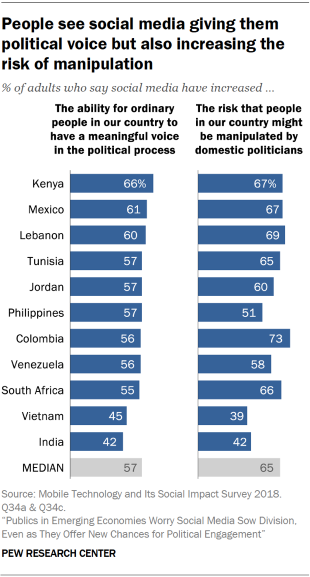 When it comes to the benefits, adults in these countries see digital connectivity enhancing people’s access to political information and facilitating engagement with their domestic politics. Majorities in each country say access to the internet, mobile phones and social media has made people more informed about current events, and majorities in most countries believe social media have increased ordinary people’s ability to have a meaningful voice in the political process. Additionally, half or more in seven of these 11 countries say technology has made people more accepting of those who have different views than they do.
When it comes to the benefits, adults in these countries see digital connectivity enhancing people’s access to political information and facilitating engagement with their domestic politics. Majorities in each country say access to the internet, mobile phones and social media has made people more informed about current events, and majorities in most countries believe social media have increased ordinary people’s ability to have a meaningful voice in the political process. Additionally, half or more in seven of these 11 countries say technology has made people more accepting of those who have different views than they do.
But these perceived benefits are frequently accompanied by concerns about the limitations of technology as a tool for political action or information seeking. Even as many say social media have increased the influence of ordinary people in the political process, majorities in eight of these 11 countries feel these platforms have simultaneously increased the risk that people might be manipulated by domestic politicians. Around half or more in eight countries also think these platforms increase the risk that foreign powers might interfere in their country’s elections.
Similarly, the widespread view that technology has made people more informed about current events is often paired with worries that these tools might make people vulnerable: Majorities in 10 of these countries feel technology has made it easier to manipulate people with rumors and false information. Further, a recent report by the Center found that a median of 64% across these 11 countries say people should be very concerned about exposure to false or incorrect information when using their phones.
What is a median?
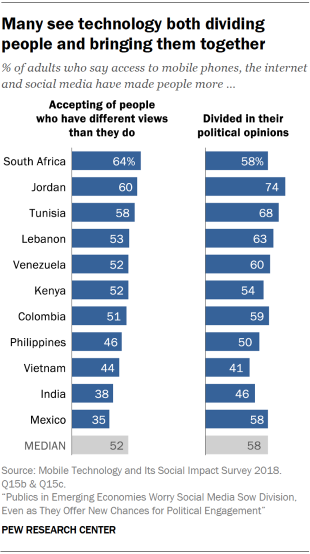 Publics in these countries are also conflicted over the extent to which technology is broadening people’s personal horizons or causing their politics to become more tribal – and many seem to see elements of both. An 11-country median of 52% say technology has made people more accepting of those who have different views than they do, while a median of 58% say it has made people more divided in their political opinions. In most countries, larger shares say technology is causing people to be more divided than say it has caused them to be open to different groups of people.
Publics in these countries are also conflicted over the extent to which technology is broadening people’s personal horizons or causing their politics to become more tribal – and many seem to see elements of both. An 11-country median of 52% say technology has made people more accepting of those who have different views than they do, while a median of 58% say it has made people more divided in their political opinions. In most countries, larger shares say technology is causing people to be more divided than say it has caused them to be open to different groups of people.
The public’s opinion is easily manipulated through social media. Videos circulating about politicians can either make them famous and likable or break them down.WOMAN, 23, TUNISIA
Those most attuned to digital technology’s potential benefits are often also most aware of its downsides
It is not simply the case that certain segments of the public have consistently positive views about the political impacts of digital technology while others feel consistently more negative. In many instances, individuals who are most attuned to the potential benefits technology can bring to the political domain are also the ones most anxious about the possible harms.
For instance, in 10 of the 11 countries surveyed, the view that technology has made people more informed is correlated with the view that technology has made people easier to manipulate with rumors and false information. And in most countries, the view that technology has made people more accepting of each other is correlated with the view that it has made people more divided in their political opinions.
The social media landscape in the 11 countries surveyed
Certain groups – such as those with higher levels of education and those who are social media users – are especially likely to note both the positive and negative impacts of technology.1, 2 Across all 11 countries, adults with a secondary education or higher are more likely to say technology has made people more informed about current events relative to those who do not have a secondary education. Yet, in nine countries, those with higher levels of education are also more inclined to say technology has made people more subject to false information and rumors. More highly educated adults are also more likely to say technology has contributed to both political divisions and tolerance of opposing viewpoints in seven of these countries (Colombia, India, Kenya, Lebanon, the Philippines, Tunisia and Vietnam).
Similarly, social media users in all 11 countries are more likely than non-users to say technology has made people more informed about current events. Users are also generally more likely to say technology has made people more accepting of those with different views, and more willing to engage in political debates. However, users are also more likely to say technology is making people more divided in their political opinions and easier to mislead with misinformation.
The public’s sense that technology brings both promise and problems is mirrored in social media users’ experiences on these platforms
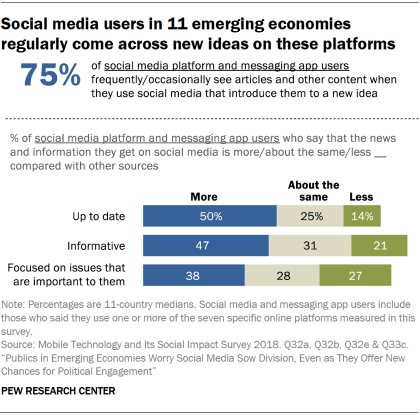 These broad public views about the positive and negative impacts of technology on the political and information environment are echoed in social media users’ lived experiences on these platforms.
These broad public views about the positive and negative impacts of technology on the political and information environment are echoed in social media users’ lived experiences on these platforms.
In some respects, social media users indicate that the nature of the content on these platforms is quite positive. In every country surveyed, for instance, majorities of social media users say they frequently or occasionally encounter content there that introduces them to new ideas. Similarly, pluralities of social media users in most countries say the news and information they get on these platforms is more up to date and more informative compared with other sources.
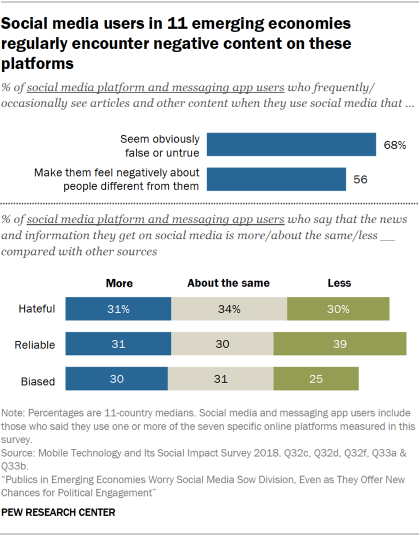 But as was true of views of the overall technology landscape, social media users see challenges as well as benefits. Most notably, majorities of social media users in 10 of these 11 countries frequently or occasionally encounter content that seems obviously false or untrue, and majorities of users in six countries regularly encounter content on these platforms that makes them feel negatively about groups of people who are different than they are.
But as was true of views of the overall technology landscape, social media users see challenges as well as benefits. Most notably, majorities of social media users in 10 of these 11 countries frequently or occasionally encounter content that seems obviously false or untrue, and majorities of users in six countries regularly encounter content on these platforms that makes them feel negatively about groups of people who are different than they are.
Social media users also express mixed opinions about the characteristics of the social media environment relative to other information sources. Only in Vietnam do a plurality of users say these platforms are more reliable than other sources they encounter. In other countries, users are more divided about whether the information on social media is about as reliable – or less so – than what they see elsewhere. Opinion is also relatively mixed across the 11 countries as far as whether the news people get on these platforms is more hateful than what they get elsewhere.
We have to understand that there are scores of websites and articles on the internet that are false and inaccurate, purely opinion, or extremely biased or slanted.WOMAN, 22, PHILIPPINES
This range of experiences and attitudes is also reflected in at least some users’ personal interactions on social media platforms. An 11-country median of 36% of social media users – including around half in Kenya and Venezuela – say they have learned someone’s political beliefs were different than they had thought based on things that person posted to social media. In all 11 countries surveyed, those who have been surprised by someone’s political beliefs in this way are more likely to say technology has made people more divided in their political opinions. In seven countries, however, these users are also more likely to say access to technology has made people more accepting of those who have different views.
More people are comfortable talking politics in person than in digital spaces
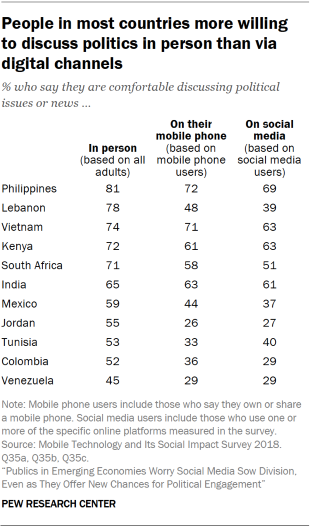 Even as social media have offered citizens new ways to encounter and share information, more people are comfortable speaking about politics in person than via mobile phones or social media. These differences are especially pronounced in Lebanon: 78% of Lebanese overall say they are comfortable discussing political issues in person, but 48% of Lebanese mobile phone users are comfortable discussing these issues on their phones and just 39% of Lebanese social media users say they are comfortable broaching these issues on those platforms.
Even as social media have offered citizens new ways to encounter and share information, more people are comfortable speaking about politics in person than via mobile phones or social media. These differences are especially pronounced in Lebanon: 78% of Lebanese overall say they are comfortable discussing political issues in person, but 48% of Lebanese mobile phone users are comfortable discussing these issues on their phones and just 39% of Lebanese social media users say they are comfortable broaching these issues on those platforms.
People who are comfortable discussing politics in digital spaces tend to be more optimistic about the impact these technologies have on politics in their country. For example, social media users who are comfortable discussing politics there are more likely to say the internet has had a good impact on politics and that social media have increased ordinary people’s ability to have a meaningful voice in politics. They also are usually more likely to describe the news they get on social media platforms positively – as more up to date, informative, reliable and focused on issues they care about – compared with other sources. And they are more likely to say they see articles on social media that introduce them to new ideas. But they are also somewhat more likely to say they regularly encounter articles or other content that makes them feel negatively about groups of people who are different from them.
Although publics in most countries are more comfortable discussing politics in person than via digital methods, people in certain countries are generally more comfortable discussing politics – whether in person, using their mobile phone or over social media – than people in other countries. The Philippines, Vietnam, Kenya and India are countries where majorities are comfortable discussing politics in person, and majorities of users are comfortable talking politics on a mobile phone or via social media. However, people’s comfort levels have little relationship with overall measures of civil liberties in their country or measures of how democratic the country is (or is not). And countries with higher levels of interpersonal trust are not more likely to be comfortable discussing politics in any of these venues.3
You know, there’s a politician that sends text messages to us saying ‘Happy birthday, from Senator this-and-that.’ Even with that, they have already got your number. What more [do they have] if you’re already on social media?MAN, 44, PHILIPPINES
These are among the major findings from a new Pew Research Center survey conducted among 28,122 adults in 11 countries from Sept. 7 to Dec. 7, 2018. In addition to the survey, the Center conducted focus groups with diverse groups of participants in Kenya, Mexico, the Philippines and Tunisia in March 2018, and their comments are included throughout the report (see Appendix A for more information).




